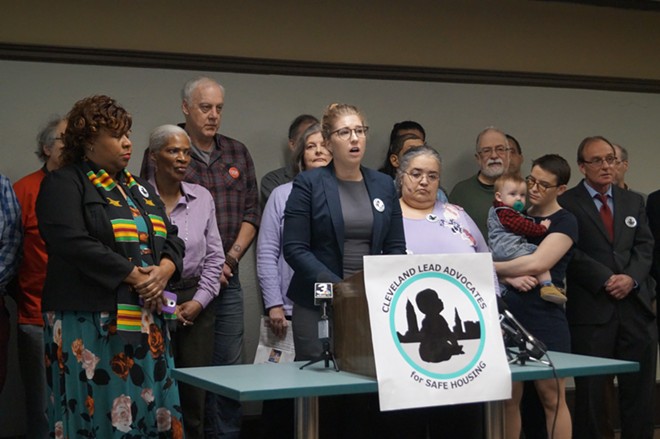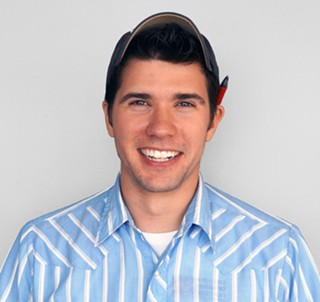CLASH Commends Lead Coalition's Recommendations to City Council, But Says Some are Insufficient
By Sam Allard on Wed, May 1, 2019 at 6:01 pm
[
{
"name": "Ad - NativeInline - Injected",
"component": "38482495",
"insertPoint": "3",
"requiredCountToDisplay": "5"
},{
"name": "Real 1 Player (r2) - Inline",
"component": "38482494",
"insertPoint": "2/3",
"requiredCountToDisplay": "9"
}
]
The Lead Safe Cleveland Coalition (LSCC) today delivered a set of 33 policy recommendations to Cleveland City Council. Council President Kevin Kelley has said that the city will use these recommendations as the basis for new legislation to combat the city's child lead poisoning crisis. He's hopeful to have a law on the books shortly after a planned lead summit in June.
The recommendations track, in broad strokes, with the lead-safe ordinance drafted by Cleveland Lead Advocates for Safe Housing (CLASH), the grassroots group that gathered more than 10,000 signatures, 6,500 of them valid, in the hopes of putting the issue before voters in November. (It was CLASH's formation, and the threat of a ballot initiative, that prompted the formation of the LSCC in the first place, after years of inactivity.)
Disclosure: The author signed the CLASH petition.
Due to a technical flaw in the petition language, CLASH's ordinance likely will not appear on a ballot. CLASH is nevertheless pursuing legal action, arguing that Council is obligated, under the City Charter, to take up the ordinance. (Cleveland.com has called on council to do so, even if not legally compelled.) CLASH has also said that it will not shy away from another petition drive if council does not pass a lead-safe ordinance.
Much like CLASH's proposal, the LSCC recommendations are premised on holding landlords accountable for ensuring that their properties are lead-safe. LSCC has proposed a lead-safe certificate program that would be rolled out over three years. It has proposed fines, not criminal charges, as the accountability mechanism for non-compliant landlords and has proposed public and private resources to help low-income landlords bring their properties into compliance.
"We aim to protect Cleveland’s children by merging practical public policies; robust and coordinated government infrastructure; knowledgeable agencies willing to collaborate and adapt; proven community programs and leadership; and public and private sector accountability," the LSCC said in a letter prefacing the recommendations.
Mark McDermott, of Enterprise Community Partners, led the LSCC's policy committee. In a press release, he said that his committee of 70+ partners collaborated on the recommendations over two months with "impressive discipline and unflinching commitment to Cleveland’s children.”
The recommendations were submitted to council with overwhelming support from the committee. The Plain Dealer reported that only four members opted out of endorsing the full set of recommendations: Mike Valerino, of the Akron-Cleveland Association of Realtors; Diana Shulsky, of Howard Hanna Real Estate Services; Anthony Brancatelli, of Cleveland City Council (Ward 12); and Rebecca Maurer, of CLASH.
The real estate reps objected, according to the PD, to a one-year ramp-up period for the certificate program. Rebecca Maurer detailed her objections in a letter (attached below). While she applauded LSCC for their hard work and for adopting a lead-safe housing mandate, she felt that, as written, the recommendations didn't go far enough to protect Cleveland's children.
Among other things, she noted that the LSCC recommendations failed to include daycare centers as properties subject to the lead-safe mandate; that they failed to provide sufficient tenant protection (a key pillar of the CLASH ordinance); and that they decreased public control over a "Lead Safe Home Fund."
(Councilman Brancatelli has not yet responded to an email seeking clarification on his objections, but this post will be updated when he does.)
CLASH distributed a press release Wednesday, commending the bulk of the LSCC recommendations and noting the significant overlap with the CLASH proposal. CLASH urged council to consider its proposal alongside the new recommendations. It noted, too, that daycare centers were not required to be lead-safe under the recommendations and that "badly needed" tenant protections were missing as well.
"Let’s not forget why we are here,” said Yvonka Hall, one of CLASH's leaders. “Lead poisoning is indeed a health problem with a housing solution. The impact of lead poisoning on education, employment and lifelong disparities is too great to be dismissed. The LSCC recommendations must be translated into a proposed law that the public can support that must be passed by City Council. Our work to make Cleveland lead safe has always focused on working together to protect our children from the dangers of lead poisoning.”
Like CLASH, LSCC said that its proposed solutions can only improve with ongoing discussion.
The recommendations track, in broad strokes, with the lead-safe ordinance drafted by Cleveland Lead Advocates for Safe Housing (CLASH), the grassroots group that gathered more than 10,000 signatures, 6,500 of them valid, in the hopes of putting the issue before voters in November. (It was CLASH's formation, and the threat of a ballot initiative, that prompted the formation of the LSCC in the first place, after years of inactivity.)
Disclosure: The author signed the CLASH petition.
Due to a technical flaw in the petition language, CLASH's ordinance likely will not appear on a ballot. CLASH is nevertheless pursuing legal action, arguing that Council is obligated, under the City Charter, to take up the ordinance. (Cleveland.com has called on council to do so, even if not legally compelled.) CLASH has also said that it will not shy away from another petition drive if council does not pass a lead-safe ordinance.
Much like CLASH's proposal, the LSCC recommendations are premised on holding landlords accountable for ensuring that their properties are lead-safe. LSCC has proposed a lead-safe certificate program that would be rolled out over three years. It has proposed fines, not criminal charges, as the accountability mechanism for non-compliant landlords and has proposed public and private resources to help low-income landlords bring their properties into compliance.
"We aim to protect Cleveland’s children by merging practical public policies; robust and coordinated government infrastructure; knowledgeable agencies willing to collaborate and adapt; proven community programs and leadership; and public and private sector accountability," the LSCC said in a letter prefacing the recommendations.
Mark McDermott, of Enterprise Community Partners, led the LSCC's policy committee. In a press release, he said that his committee of 70+ partners collaborated on the recommendations over two months with "impressive discipline and unflinching commitment to Cleveland’s children.”
The recommendations were submitted to council with overwhelming support from the committee. The Plain Dealer reported that only four members opted out of endorsing the full set of recommendations: Mike Valerino, of the Akron-Cleveland Association of Realtors; Diana Shulsky, of Howard Hanna Real Estate Services; Anthony Brancatelli, of Cleveland City Council (Ward 12); and Rebecca Maurer, of CLASH.
The real estate reps objected, according to the PD, to a one-year ramp-up period for the certificate program. Rebecca Maurer detailed her objections in a letter (attached below). While she applauded LSCC for their hard work and for adopting a lead-safe housing mandate, she felt that, as written, the recommendations didn't go far enough to protect Cleveland's children.
Among other things, she noted that the LSCC recommendations failed to include daycare centers as properties subject to the lead-safe mandate; that they failed to provide sufficient tenant protection (a key pillar of the CLASH ordinance); and that they decreased public control over a "Lead Safe Home Fund."
(Councilman Brancatelli has not yet responded to an email seeking clarification on his objections, but this post will be updated when he does.)
CLASH distributed a press release Wednesday, commending the bulk of the LSCC recommendations and noting the significant overlap with the CLASH proposal. CLASH urged council to consider its proposal alongside the new recommendations. It noted, too, that daycare centers were not required to be lead-safe under the recommendations and that "badly needed" tenant protections were missing as well.
"Let’s not forget why we are here,” said Yvonka Hall, one of CLASH's leaders. “Lead poisoning is indeed a health problem with a housing solution. The impact of lead poisoning on education, employment and lifelong disparities is too great to be dismissed. The LSCC recommendations must be translated into a proposed law that the public can support that must be passed by City Council. Our work to make Cleveland lead safe has always focused on working together to protect our children from the dangers of lead poisoning.”
Like CLASH, LSCC said that its proposed solutions can only improve with ongoing discussion.
Tags:
SCENE Supporters make it possible to tell the Cleveland stories you won’t find elsewhere.
Become a supporter today.
About The Author
Sam Allard
Sam Allard is the Senior Writer at Scene, in which capacity he covers politics and power and writes about movies when time permits. He's a graduate of the Medill School of Journalism at Northwestern University and the NEOMFA at Cleveland State. Prior to joining Scene, he was encamped in Sarajevo, Bosnia, on an...
Scroll to read more Cleveland News articles
Newsletters
Join Cleveland Scene Newsletters
Subscribe now to get the latest news delivered right to your inbox.















